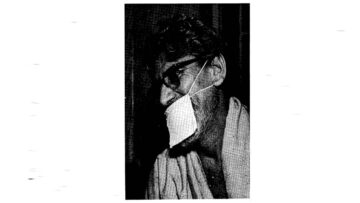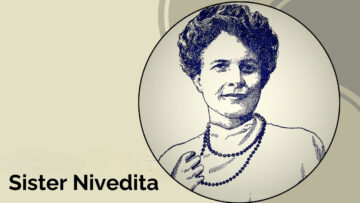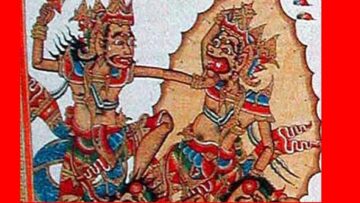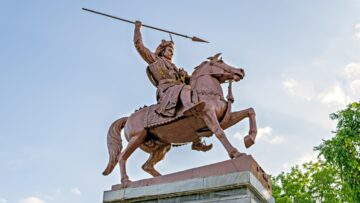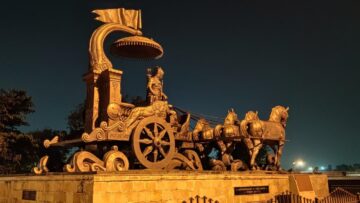In an earlier article, I looked at the thirteen occurrences of the words, यतो धर्मस्ततो जयः (where there is dharma, there is victory) in the Mahabharata, using the Critical Edition as my reference. These words are spoken by Arjuna, Dhritarashtra, Drona, Gandhari, Karna, Krishna, and Sanjaya.
These words are also the emblem of the Supreme Court of India. The first time these words are spoken in the epic is in the Udyoga Parva, by Dhritarashtra, and the last time by Bhishma, in the Anushasana Parva, just before he takes Krishna’s permission to depart for heaven.
I also pointed out, as best as I could find, only once are these words, an expansion of the earlier phrase, spoken in the Mahabharata, Bhishma – यतः कृष्णस्ततो धर्मो यतो धर्मस्ततो जयः (where there is Krishna, there is dharma; where there is dharma, there is victory), but a variation of these words can also be found in the text – यतो धर्मस्ततः कृष्णो यतः कृष्णस्ततो जयः (where there is dharma, Krishna is there; where there is Krishna, victory is there), also spoken by Bhishma.
So, that led me to another search, of another set of words – यतः कृष्णस्ततो जयः (where there is Krishna, there is victory). These words, in this order, are said six times in the Mahabharata (going by the Critical Edition) – thrice in the Bhishma Parva (all in the Bhagavada Gita Parva, though not in the actual Bhagavada Gita), and once each in the Adi (Viduragamana), Udyoga (Yana-Sandhi), and Shalya Parvas (Gada-Yuddha).
1.197.25 – Adi Parva, Viduragamana Parva
बलवन्तश्च दाशार्हा बहवश्च विशां पते
यतः कृष्णस्ततस्ते स्युर्यतः कृष्णस्ततो जयः
balavantaś ca dāśārhā bahavaś ca viśāṁ pate
yataḥ kr̥ṣṇas tatas te syur yataḥ kr̥ṣṇas tato jayaḥ
“The Dasharhas are powerful and numerous. They will be where Krishna is. And where Krishna is, victory will certainly be there.”
Dasharha was a famous king in the Yadu lineage, and thus Krishna and the Yadavas are also sometimes referred to as Dasharhas.
Dhritarashtra was surely one of the luckiest characters in the Mahabharata. He got to witness Krishna’s Viraat form, hear the Bhagavada Gita via Sanjay, and Vidura’s words of advice were never far from him.
Time and again, Vidura offered the most sagacious advice a king could hope for. Dhritarashtra doggedly refused to heed his advice and give back the Pandavas half the kingdom, which was their right as per the conditions agreed to at the second game of dice.
In the Viduragaman Parva (part of Adi Parva), we learn that Dhritarashtra’s spies brought him word that the Pandavas had succeeded in Droupadi’s Swayamvara. Not only had the Pandavas survived the conspiracy of Varanavata, but also they now had the powerful king, Drupada, as a relative and ally.
After Duryodhana, Duhshasana, and Karna returned to Hastinapura, their pride broken, Vidura broke the news to Dhritarashtra that the Pandavas were alive, told him that Duryodhana, Duhshasana, and Karna were evil and that the Kurus would be better off befriending Krishna.
5.66.9 Udyoga Parva, Yana-Sandhi Parva
यतः सत्यं यतो धर्मो यतो ह्रीरार्जवं यतः
ततो भवति गोविन्दो यतः कृष्णस्ततो जयः
yataḥ satyaṁ yato dharmo yato hrīr ārjavaṁ yataḥ
tato bhavati govindo yataḥ kr̥ṣṇas tato jayaḥ
“Wherever there is truth, wherever there is dharma, wherever there is modesty, wherever there is uprightness, Govinda is present there. Wherever there is Krishna, victory exists there.”
The thirteen years of exile were over. The Pandavas wanted their kingdom back, and Dhritarashtra didn’t want to give it back. He sent Sanjaya to Upaplavya. Sanjaya returned late at night and briefly berated the king, sending the king into a state of disquiet, leading to the Vidura Niti.
The next morning, in the assembly, everyone was assembled. Apart from Dhritarashtra, there were Bhishma, Drona, Kripa, Shalya, Kritavarma, Jayadratha, Ashvatthama, Vikarna, Somadatta, Bahlika, Vidura, Yuyutsu, Duhshasana, Chitrasena, Shakuni Soubala, Durmukha, Duhsaha, Karna, Uluka, Vivimshati, and Duryodhana.
In that assembly, Sanjaya delivered his message and repeated what Yudhishthira had told him, and said that wherever there is truth, dharma, modesty, and uprightness, there is Govinda, and wherever there is Krishna, there is victory.
6.21.12 Bhishma Parva, Bhagavada Gita Parva
एवं राजन्विजानीहि ध्रुवोऽस्माकं रणे जयः
यथा मे नारदः प्राह यतः कृष्णस्ततो जयः
evaṁ rājan vijānīhi dhruvo ’smākaṁ raṇe jayaḥ
yathā me nāradaḥ prāha yataḥ kr̥ṣṇas tato jayaḥ
“O king! Know that it is for this reason that our victory in this battle is certain. Narada has said that where there is Krishna, victory is there.”
The war was about to begin, the armies of the Kurus had arrayed themselves on the battlefield of Kurukshetra. Yes, we know the Bhagavada Gita is about to begin, Arjuna is about to experience the pangs of doubts and the wisdom of killing one’s elders and relatives, but before that, it was the turn of Yudhishthira to doubt their ability to win against an army led by Bhishma, who had formed an impenetrable formation.
Sanjay described the battlefield and Yudhishthira’s distress to Dhritarashtra. Yudhishthira approached Arjuna with his doubts. Arjuna at this point was still resolute and certain of their chances of victory. He comforted his brother by telling him what Brahma had once told Indra, that “Narada has said that where there is Krishna, victory is there.”
6.21.14 Bhishma Parva, Bhagavada Gita Parva
अनन्ततेजा गोविन्दः शत्रुपूगेषु निर्व्यथः
पुरुषः सनातनतमो यतः कृष्णस्ततो जयः
anantatejā govindaḥ śatrupūgeṣu nirvyathaḥ
puruṣaḥ sanātanatamo yataḥ kr̥ṣṇas tato jayaḥ
“Govinda is infinite in his energy. He is without pain even amidst a multitude of enemies. He is the eternal being. Where there is Krishna, victory is there.”
In the same conversation, two shlokas later, we get the same message from Arjuna to Yudhishthira.
6.41.55 Bhishma Parva, Bhagavada Gita Parva
यतो धर्मस्ततः कृष्णो यतः कृष्णस्ततो जयः
युध्यस्व गच्छ कौन्तेय पृच्छ मां किं ब्रवीमि ते
yato dharmas tataḥ kr̥ṣṇo yataḥ kr̥ṣṇas tato jayaḥ
yudhyasva gaccha kaunteya pr̥ccha māṁ kiṁ bravīmi te
“Where there is dharma, Krishna is there. Where there is Krishna, victory is there. O Kounteya! Go and fight. Ask me. What will I tell you?’”
The war had still not begun, though by now Sri Krishna had delivered the Bhagavad Gita to Arjuna. At the very start of the next Parva, the Bhishma Vadha Parva (which is nearly four-thousand Shlokas long), Yudhishthira removed his armour, set down his weapons, got down from his chariot, and approached the Kuru warriors.
This led to great consternation among the Pandava army and much derision from Duryodhana, but Yudhishthira had come to take blessings and permission to engage in battle from Bhishma, Drona, and Kripa. Bhishma told Yudhishthira that with Krishna on their side, victory was certain – “Where there is dharma, Krishna is there. Where there is Krishna, victory is there.”
Remember, from the earlier article, that Bhishma tells Duryodhana the same thing (6.62.34), albeit with a slight change in order: यतः कृष्णस्ततो धर्मो यतो धर्मस्ततो जयः (where there is Krishna, there is dharma; where there is dharma, there is victory).
9.61.30 Shalya Parva, Gada Yuddha Parva
उपप्लव्ये महर्षिर्मे कृष्णद्वैपायनोऽब्रवीत्
यतो धर्मस्ततः कृष्णो यतः कृष्णस्ततो जयः
upaplavye maharṣir me kr̥ṣṇadvaipāyano ’bravīt
yato dharmas tataḥ kr̥ṣṇo yataḥ kr̥ṣṇas tato jayaḥ
“In Upaplavya, maharshi Krishna Dvaipayana told me, “Where there is dharma, Krishna is there. Where there is Krishna, victory is there.”
The war was over, the Pandavas emerged victoriously, and they all entered the Kaurava camp, which was desolate and bereft of its former glory. Here Yudhishthira thanked Krishna for ensuring their victory in the battle and recalling Krishna Dvaipayana’s words, told Krishna what the sage had told him – that where there was dharma, Krishna was there, and where there was Krishna, there was a victory.
Sanjaya’s words declared in the assembly hall of the Kurus, had fallen on deaf words.
References
- Mani, Vettam. Puranic Encyclopedia. Motilal Banarsidas, 1975
- Debroy, Bibek. The Mahabharata, Vol. 1. Penguin India, 2010
- Debroy, Bibek. The Mahabharata, Vol. 4. Penguin India, 2011
- Debroy, Bibek. The Mahabharata, Vol. 5. Penguin India, 2012
- Debroy, Bibek. The Mahabharata, Vol. 7. Penguin India, 2013
- Bhandarkar Oriental Research Institute, Electronic text of the Mahabharata, 1999. (https://bombay.indology.info/ – last accessed Jan 31st, 2021)
Disclaimer: Views expressed are personal
Featured Image Credits: indiatvnews
Disclaimer: The opinions expressed in this article belong to the author. Indic Today is neither responsible nor liable for the accuracy, completeness, suitability, or validity of any information in the article.





